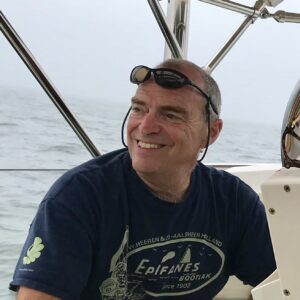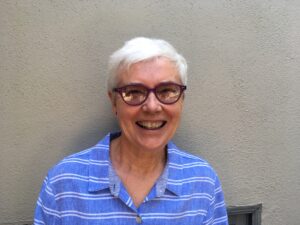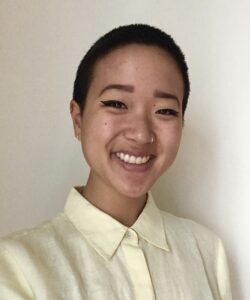The change we create together is larger than our individual actions. Meet three Corporate Accountability members bringing transformative change to the table.
Lining up the pieces: Bill Creighton
Building power through connections: Mary Hayden
A global approach to climate justice: Amy Wang
Lining up the pieces: Bill Creighton

“What I naturally see in the world around me is the spaces between,” says Bill Creighton. He sees the gaps—where pieces don’t align—and what needs to shift for them to align. Whether he was helping people reconnect with being back in charge of their own lives as an EMT or trying to understand the economic system that enabled his family to amass a disproportionate amount of wealth, Bill saw where the pieces didn’t align.
Perhaps this way of seeing came from his childhood of growing up in two worlds. His parents divorced when he was three. As a result, he spent his weekdays in his mother’s world of intellectual and radical activism in Cambridge, MA in the 1960s. And then he spent the weekends with his father in Manchester, MA, where he entered the world of “blueblood conservatism.”
Bill felt like an outsider in both worlds—so as a young adult, he tried to eschew his father’s wealth and privilege. He moved to a remote island off the coast of Maine, became a boat builder and then an EMT. He also became a nurse and learned a variety of trades. He never spoke of his wealth. But he realized that his economic position enabled him to pick up and move or change jobs when the work became more of a grind than stimulating—while his friends and coworkers didn’t always have the means to do the same.
Bill’s ability to see where things “don’t fit” led him to the understanding that the difference between his freedom and his friends’ situations were the results of economic policies that facilitate the mass accumulation of wealth into the hands of a few. Eventually he came to see economic inequity as core to society’s deepest problems.
And he was determined to help move the pieces in order to create a different kind of society.
That’s where Corporate Accountability comes in. Bill appreciates the organization’s in-depth analysis of how corporations work—“and then figuring out where to twist, where to make change, where the pressure is that lines the puzzle pieces up in a way that shifts the reality within the corporation. It’s a really elegant concept,” he says. “It’s very beautiful.” He believes this approach gives people the opportunity to see that they don’t have to concede to corporate power. Instead, “we can actually stand up to it and take care of one another in a way that feels good and empowering.”
Bill saw this work in action when he joined the Corporate Accountability team at last year’s water summit in Abuja, Nigeria. “It was very moving,” he says, to witness people from around the world gather to figure out how to rein in corporate power and thereby take control over their lives. “I’ve learned so much from my experience with Corporate Accountability. I feel blessed to be in this stream of money, which I can put into the hands of people who are changing the paradigm.”
Building power through connections: Mary Hayden

As a people-person who likes to make connections, Mary Hayden has led the charge on Corporate Accountability organizing in southern California. “I met people through a local climate group. It was easy to ask some of them if they would be interested in pushing Attorney General Becerra on climate liability,” she explains. She also invited a Corporate Accountability member from the Bay Area to join.
This group has met with the staff of the governor and state attorney general to demand that they sue the fossil fuel industry for its role in knowingly fueling climate change. “We haven’t met that goal yet. But we are still optimistic that we can,” says Mary. “This experience has made me realize how long it takes to get these kinds of projects completed, and how continuing pressure is really important.”
And she’s glad to have a group of people to join forces with. Over the past few months, they’ve stayed connected virtually, attending webinars and other educational events together. “We keep each other in the know so we can understand the issues better and make a better case when we’re pressuring public officials.” She also appreciates the support she receives from Corporate Accountability staff in carrying out the work. “I’m really impressed by your follow through. Everybody supports the people who are willing to volunteer, and that makes a huge difference.”
But Mary’s involvement with Corporate Accountability isn’t only about serious business. She loves to have parties, and before the pandemic she teamed up with two fellow Corporate Accountability members—Donna and Amy—to throw a house party for the organization. Hosted at Donna’s house, the party helped spread the word about and raised funds for the climate campaign. (The guests also were treated to Mary’s appetizers featuring pomegranates from her back yard.)
A Corporate Accountability member since the days of the Nestlé boycott in the 1970s, Mary seeks out opportunities to connect people with this work because she believes strongly in the mission to curb corporate power. “I’ve always been suspicious of the outsized role that corporations play in our public life,” she says. “And Corporate Accountability is one of the few organizations that directly address this problem.”
A global approach to climate justice: Amy Wang

Amy Wang’s interest in Corporate Accountability stemmed from her early understanding that addressing the climate crisis would take far more than driving less or carrying reusable grocery bags. “I experienced a lot of fear and grief and anxiety around climate change growing up,” she explains. But it was difficult for her to pin down how to act in a meaningful way around the crisis.
Then she discovered the divestment movement in high school, and became deeply involved in campaigning on this issue at Columbia University where she got her degree. Through this work, she organized with students and other activists around the country to pressure their institutions to divest from fossil fuel corporations.
It was a powerful experience, she says. “The divestment movement was the first time I felt empowered to take action beyond individualistic, consumer-type actions that we’re told will fight climate change.”
So when she learned about Corporate Accountability from a friend at Resource Generation, another organization she is involved with, her interest was piqued.
Corporate Accountability’s work resonates with her understanding of what’s needed to create a different path forward. Shining a light on corporate power and abuse “is tied in to the different fights for justice that people are engaged in, in many different movements,” she says. “It’s not just the fossil fuel corporations that are contributing to climate change. Multinational corporations are displacing people and desecrating land and water. All of it is absolutely a part of the fight for climate justice.”
Although Amy is relatively new to Corporate Accountability, she’s already helped organize a house party to spread the word about the climate campaign, in collaboration with two long-time members. Having taken some time off from climate organizing since moving to LA, she was happy to connect back to an issue she is passionate about. “It was a good opportunity to support the work that people specifically on the front lines of climate change have been organizing at climate negotiations,” she explains.
In fact, Corporate Accountability’s work with groups in the Global South as well as coalitions with strong Global South leadership like the Global Campaign to Demand Climate Justice is one of the things Amy appreciates most: “That’s where the trust came in for me—seeing that Corporate Accountability was taking the lead of organizations at the front lines in addition to really holding down your own sphere of organizing.”
She has always wanted to have her own organizing be more on a global scale, and she recognizes it isn’t easy: “How do you build international solidarity when there’s so many things that make that difficult? I think that Corporate Accountability is doing a great job of building those relationships and strengthening them.”
And lately, for her personally, organizing has been all about focusing on the relationships: “There’s the money that we can move and things that we can do, but at the end of the day, the relationships are truly the most important thing. And so I’ve been trying to focus on that, and I’m finding that it’s bringing me a lot of joy.”






